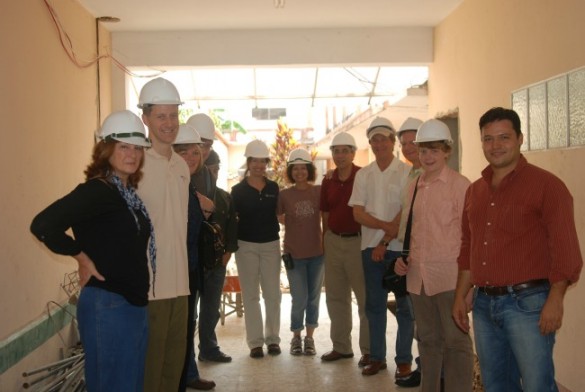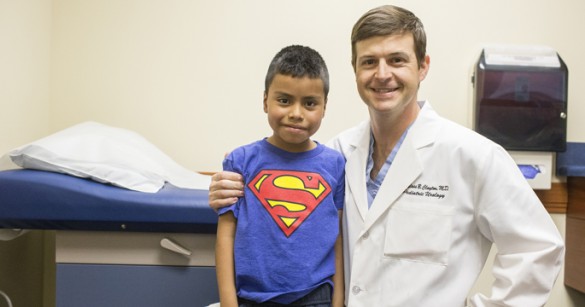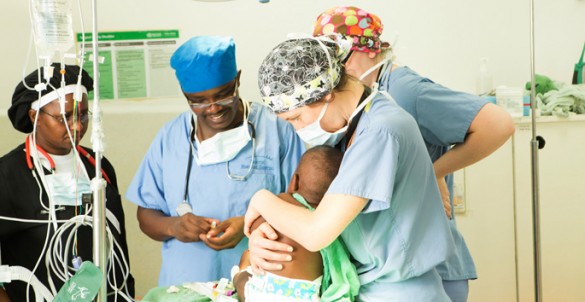
Vanderbilt University’s expanded commitment to research and sustainable development in Guatemala is reflected in this spring’s opening of a Guatemala City field station that is home to 13 projects.
The field station, located at the Moore Pediatric Surgery Center, provides support for diverse programs ranging from pediatric surgery to study of Mayan languages as well as small-scale coffee production.
“The 13 initiatives share a common vision for sustainable improvements in the quality of life,” said Edward F. Fischer, professor of anthropology and director of the Center for Latin American Studies at Vanderbilt. “Bringing them together under one roof complements the ‘one university’ model espoused by Vanderbilt’s senior leadership.” He noted that this initiative, by building on collaborations among Vanderbilt departments, programs and schools, avoids the tendency of units in some large research universities to operate in isolation and in competition with each other.
“The Monroe Carell Jr. Children’s Hospital at Vanderbilt is proud to be part of this ‘one university’ plan being implemented in Guatemala,” said John W. Brock III, surgeon-in-chief and professor of urologic surgery. “Our relationship with the Shalom Foundation and the state-of-the-art Moore Surgery Center allows us to provide continuity of care for children in this region. The field station deepens our relationship with other Vanderbilt departments involved in Guatemala.”

Each year at least 50 Vanderbilt graduate and undergraduate students travel to Guatemala to carry out research and engage in service learning. Vanderbilt’s work in Guatemala began in the mid-1980s with archaeological excavations and expeditions led by Arthur Demarest, the Ingram Professor of Anthropology. At the time, Guatemala was still in the midst of a 36-year civil war that ended with the signing of peace accords in 1996. Since then, Vanderbilt’s interest and presence in Guatemala have steadily increased.
“In a country that has experienced some transitory aid efforts, Vanderbilt has achieved effective and sustainable initiatives involving the School of Medicine, Nursing, Engineering, Owen and the College of Arts and Science,” Fischer said. “Guatemala’s proximity and diversity makes it an ideal site for these projects. The Central American nation is roughly the same size in area as Tennessee, with double the population and less than a fifth the size of the state’s economy.”
The field station received significant support from the Monroe Carell Jr. Children’s Hospital, Vanderbilt International Office, Center for Latin American Studies and Shalom Foundation.
Current Vanderbilt initiatives in Guatemala include:
- Moore Surgery Center in Guatemala City. The Monroe Carell Jr. Children’s Hospital has worked closely with the Shalom Foundation as part of an innovative “medical timeshare” for surgical missions to Guatemala.
- An intensive summer program for the study of the K’iche’ Mayan language in Nahualá, Guatemala. The program, directed by the Center for Latin American Studies, receives U.S. Department of Education funding to offer a two-year sequence of intensive K’iche’.
- Primeros Pasos, a rural health clinic in Quetzaltenango founded by Vanderbilt alumnus Brent Savoie. He leads the Inter-American Health Alliance that provides most of the funding for Primeros Pasos. The clinic provides a base for service-learning trips, the Emphasis Program and Project Pyramid.
- Latin American Public Opinion Project (LAPOP), which surveys opinions regarding democracy and security in Guatemala and elsewhere. Every two years LAPOP carries out the AmericasBarometer survey, which currently covers 26 nations.
- Service-learning course taught by Cynthia Paschal, associate dean and associate professor of biomedical engineering. Students work on medical equipment at Moore Surgery Center and other Guatemalan hospitals. They collaborate with engineering students from the Universidad del Valle of Guatemala.
- Manna Project, with one of three permanent sites in Guatemala. Manna is an organization dedicated to connecting Vanderbilt students with service opportunities through a range of local and global initiatives.
- Vanderbilt Institute for Coffee Studies. The institute collaborates with Anacafé, the national coffee producers association, to study multi-dimensional measures of development around small-scale coffee production.
- Project Pyramid, led by Bart Victor, the Cal Turner Professor of Moral Leadership at the Owen Graduate School of Management. Students develop strategic planning and business models for projects ranging from micro-finance to malnutrition.
- An international component to the Nurse-Midwifery Program in the Vanderbilt School of Nursing. Students work with local midwives and Primeros Pasos.
- Vanderbilt Cancuén Archaeology Park, directed by Demarest. The program integrates local development, health projects and eco-tourism.
- Vanderbilt’s Alternative Spring Break program. Groups that are organized through the Office of Active Citizenship and Service have traveled to Primeros Pasos annually since 2005.
- A year-long Vanderbilt Initiative for Scholarship and Global Engagement (VISAGE) course, which is offered by the centers for Medicine, Health, and Society and Latin American Studies. Students spend a summer working on projects in Guatemala.
- Maní+, a project started by Fischer with support from the Vanderbilt Institute for Global Health and the Shalom Foundation. Its purpose is to combat childhood malnutrition.
For more information on Vanderbilt initiatives in Guatemala, email Avery Dickins de Girón, executive director, Center for Latin American Studies or call 615-343-1750.















